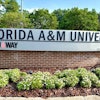Change is coming in the field of medicine along the Gulf Coast.
Xavier University of Louisiana, an historically Black university (or HBCU) in New Orleans and top graduator of Black students who pursue medical degrees and doctorates in the health sciences, is partnering with Ochsner Health, the area’s leading medical training center, to open Xavier Ochsner College of Medicine (XOCOM).
 Dr. Leonardo Seoane, executive vice president and chief academic officer of Ochsner Health, and first appointed dean of XOCOM.
Dr. Leonardo Seoane, executive vice president and chief academic officer of Ochsner Health, and first appointed dean of XOCOM.
“This building will be a beacon of hope for Black and Brown young kids throughout the region, where they can see physicians who look like them,” said Dr. Leonardo Seoane, executive vice president and chief academic officer of Ochsner Health, and first appointed dean of XOCOM. “If they can do it, I can do it, too. This can be me.”
XOCOM will join the four current HBCU Medical Schools at Howard University, Morehouse School of Medicine, Meharry Medical College, and the Charles R. Drew University of Medicine and Science. Morgan State University has plans to open an osteopathic medical school in 2025.
Xavier and Ochsner, who first collaborated in the 1980s at Xavier’s College of Pharmacy, began serious planning for the creation of a medical school as early as 2016, but the COVID-19 pandemic put those plans on pause. The pandemic made it clearer why a regional HBCU medical school was so critically needed, said Xavier President Dr. C. Reynold Verret.
“If you want to think about the thesis that trust and lack thereof is the underlying factor in health inequities and disparities, COVID was an unplanned experiment where trust in the medical system became a barrier to quality care,” said Verret, adding that this mistrust came from years of abuse and flagrant experimentation on the Black community, like the Tuskegee Syphilis Study or the infamous tale of Henrietta Lacks, and from politicized misinformation.
 Xavier President Dr. C. Reynold Verret.
Xavier President Dr. C. Reynold Verret.
Several studies have shown that patient care and life-expectancy greatly improve when doctors and patients share a “concordance of race,” said Dr. Veronica Gillispie-Bell, Xavier alum, OBGYN, and member of XOCOM’s founding board of directors.
“Data shows that physicians of color are more likely to see patients with Medicaid, more able to establish trust, and bring a shared upbringing and understanding of culture,” said Gillispie-Bell. “To think those things have been missing, you can understand why medical mistrust is a real thing.”
Physicians of color do not mirror their population demographics. A 2023 report from the Association of American Medical Colleges (AAMC) found that only 5.7% of the nation’s doctors identify as Black, despite Black Americans making up 14.2% of the population. Just 6% of physicians identify as Latinx, but Latinx Americans are 19% of the population and the fastest growing demographic. The AAMC has also predicted a shortage of 86,000 American physicians by the year 2036, and Louisiana is anticipated to rank third on the shortage list by 2030.
That’s why Seoane said it is so important to not only open a medical school in the South, but also to open a medical school at an HBCU, where Black and Brown students are given the support they need to succeed in their pursuit of a medical degree.
 Xavier student hard at work.
Xavier student hard at work.
The partnership with Ochsner is also key, as their specialists will allow XOCOM’s medical students to study subspecialities, some that students may be initially unaware of. XOCOM’s program will include built in residencies and fellowships, which bodes well for the Gulf Coast as 70% of physicians end up practicing within 70 miles of their training, said Seoane.
“It’s not just good for the Gulf Coast, it’s also good for the nation,” he added. “We understand some of those students will go back [to their homes] throughout the U.S. and serve their communities.”
But this new program is just one drop in the bucket to continue to diversify medicine, said Dr. Derek Robinson, Xavier alum, board member, and divisional senior vice president and chief medical officer at Health Care Service Corporation in Chicago. It will take partnerships like Xavier and Ochsner’s, and educational commitment at all levels to improve STEM [science, technology, engineering, and mathematics] education and providing advanced placement courses. These changes can help minoritized youth discover and fall in love with medical sciences, said Robinson.
XOCOM is seeking accreditation from the Liaison Committee on Medical Education and the Southern Association of Colleges and Schools Commission on Colleges, expected to take roughly three years. Once approved, XOCOM will admit its first class of 50, eventually admitting up to 100 students in each cohort.
“I think it’s really exciting. Xavier has been realizing its mission for nearly a century, its individuals from all walks of life are helping to make the world more just and more human,” said Robinson. “This work will inspire bold efforts to expand inclusiveness, in terms of access to careers and healthcare in the U.S. It’s not an obligation that Xavier carries alone, it’s the collect efforts of universities and local health partners across the country to make a difference.”
Liann Herder can be reached at [email protected].




















